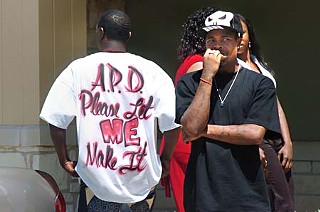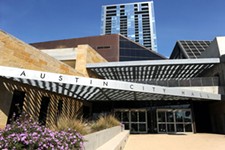The Daily Hustle: 7/30/10
No settlement in Sanders case
By Wells Dunbar, 12:00PM, Fri. Jul. 30, 2010
The City Council rejected any settlement with the family of Nathaniel Sanders II yesterday.
After an extremely lengthy executive session where council privately discussed the matter, and an hour's worth of public testimony, council finally discussed the matter themselves.
A substitute motion from Chris Riley offered to pay the family $500,000, $250,000 below the original settlement proposal of $750,000. Riley spoke about the need for community reconciliation and to move forward, but noted in a trial, "we find ourselves in an adversarial relationship with the Sanders family." Searching for "an end that recognizes the legitimate concerns on both sides," Riley noted that more money had been paid out in other officer involved shootings, but ones in which the officer was terminated. Seeking a settlement figure that wouldn't be "perceived as an admission the shooting was justified," he then offered $500,000, an admittedly "absolutely arbitrary" figure "which is far less than Nathaniel Sanders life was worth."
Randi Shade decided to start her words by quoting from a widely-circulated article in The Boston Globe, "How facts backfire," one that argues "our beliefs can dictate the facts we chose to accept." Agreeing with Riley's motion, she said "I sincerely believe that arriving at a settlement agreement that acknowledges that mistakes have been made on all sides, but also doesn't come with the frame as an unjustified shooting, is in the best interest of the city." Going back over the case – one city staffer told the Hustle that in their four-hour long executive session, the council members were essentially retrying the case – she stated "Nathaniel Sanders had a gun," causing the already agitated crowd to begin shouting things like "No fingerprints!" Shade continued, "I can't support a settlement that attaches to it a city admission of an unjustified shooting."
Sheryl Cole spoke next, saying "We have simply never, to my knowledge, in the history of the city, done this. Where we've had a settlement offer, where we've instructed staff to go and negotiate in good faith and they have done that and come back with an offer, and we decide that it is too much, and put another number on the table. All I know is that we said 'go negotiate in good faith' and gave directions that included this amount to this level. Not only have we never negotiated or put out there a counteroffer in a litigation case, we've never done that in real estate transactions. Are we all of a sudden going to be re-evaluating what we gave staff instructions to do? – It's bad policy because it puts us in uncharted waters."
Bill Spelman, also opposing the $500,000 settlement, noted the lawyer for the Sanders family, Adam Loewy, "claimed in an unguarded moment that if we accepted the settlement, that we were somehow admitting something" – an argument central to the Austin Police Association's opposition to the case. "I'm an adult. I can choose what it is to believe. I can look at the facts for myself and decide what it is that I think is true. If Adam tells me accepting $750,000 is a settlement, somehow admitting something, admitting that officer was guilty to some degree of making a mistake or conduct of some sort, that's Adam's opinion, not my opinion. I do not feel bound to accept Adam's opinion in this matter."
"I would like to have paid $500,000 or some other smaller number," he continued. "I always would like to pay less money to benefit the taxpayers. But this is not an unreasonable figure. We do not have another opportunities to undo that figure. That figure is what it is. Weeks ago, months ago, through the negotiation process we might have ended up with a number like $500,000, but that is simply an unrealistic number right now."
Laura Morrison spoke next, attacking another plank of the anti-settlement argument. "There have been calls, obviously, for folks saying that we need to go to trial and have the full dialogue. A federal court case is not a place to have a dialogue. The attorneys on either side are trying to constrain everything that the other side is saying. It's not the place to have a dialogue."
"Two weeks ago, when we started really looking at this decision, it felt like a very complicated decision to me," she said in conclusion. "Today it feels very simple. And the simple answer for me is that it is right to accept the settlement as recommended by the legal staff."
Lee Leffingwell then spoke, arguing that "the substitute motion number of $500,000 unfortunately in my view, is not much difference" from the original $750,000 figure, which he saw as exorbitant. "There could be a business case, I believe, made for a number that would basically cover the city's expenses and litigation going forward and so forth, and I don't discount that. But that number is far, far below either one of the numbers that we're talking here today." Moreover, he alleged that "this proposed settlement sends a message that the City of Austin admits that this was an unjustified shooting. I don't admit that – I don't think anyone here on the dais admits that. But that's one of those things that once it's out there, that genie is very, very hard to put back in the bottle. In fact impossible."
"I don't want to dwell on monetizing this issue, but what we're talking about here is taking taxpayer money from other taxpaying citizens," he said, returning to the settlement size. "There has to be a clear and compelling case for that transfer," one he didn't think had been made.
"I do not believe if we take this to trial that we are immoral," said Mike Martinez, another vote against the settlement. "I do not believe if we go to trial that we have no integrity – I don't believe that a community can come together if we agree to a settlement. I don't believe in the long run that we can all agree with what happened and move forward. I do personally feel, though, that a community can much easier understand and come to agreement when you let it go through the justice system process that we have in place. And that is through a jury trial. And that is why I believe we should continue forward. My position is not just a rejection of a settlement offer. It's more about moving forward in the process that's available to us and that is through a federal jury trial."
A vote came on Riley's substitute motion, which failed 2-5, Riley and Shade the only two ayes.
Sheryl Cole then began speaking in support of the original settlement. "The premise that somehow if we go to trial we're going to gain more transparency is just simply not true," promising that materials currently suppressed – documents obtained by the Sanders family during discovery – would be available once the case was settled. "On a national level, the O.J. Simpson trial, that that certainly did not result in community reconciliation. Locally, we know that with the Cedar Avenue trial, that that certainly did not result in community reconciliation." Cole emphasized that a trial is not only painful for the Sanders family, but former officer Leonardo Quintana as well, saying many officers at trial "never get over that anyway, because it's such a traumatic experience."
Cole then said the council needed "to put the city first, and I mean the entire city. I don't mean the 1,000 that worked on our campaign, or the 500 who gave you money," a subtle allusion to the APA and its Chamber of Commerce-flattering campaign, "or the 10,000 that you might get emails and hear from, or the 50,000 that voted for you – because when we raised our hand we said we were governing for 750,000, whether they voted or gave money or did anything."
Spelman then spoke one last time, again dismantling arguments against settlement. "There was a comment a few minutes ago that in order to protect Austin taxpayers we had to vote against a settlement. In fact, the opposite is true. If we are trying to protect Austin taxpayers we need to vote in favor of the settlement, because a settlement guarantees the taxpayers will have to spend no more than $750,000." He also argued a federal trial could cull "jurists from not just Travis County but all over Texas, including Levelland and God help us, Tulia."
"I think we need to settle this case here and now because as long as we talk about this case, as long as we talk about going to court, as long as we talk about appeals – it's going to be months and months and maybe careers before we stop talking about all this stuff if we go in the direction of going to court. I think it's time for us to change the subject. We should stop arguing about who's to blame for what's happened in the past and we should accept responsibility for making sure that we do not repeat the past, that this never happens again, and the best way to do that is to accept the settlement and move on."
The motion then failed 4-3, neither Shade or Riley siding with Cole, Morrison and Spelman.
The discussion ended in tumult. Reverend Freddie Dixon, Director of Community Affairs at UT's Division of Diversity and Community Engagement, came to the microphone to speak, unprompted. Men stormed out of the chambers, screaming. Accusations of the mayor and council members being bought off by the APA came from the audience. Randi Shade said "I think that it's incredibly insulting to suggest that any of us who voted the way we did has anything to do with the police union – to ignore the fact that there are a lot of ways to look at this – it's just as outrageous to ignore the fact that there have been so many people who distrust police officers, but it is just – as every African-American male is not a criminal and carrying a gun, it is true that not every officer … " at which she dropped her analogy. Shade continued, "I'm just going to say that I did not make this vote to try to not hurt the feelings of the police association. That was the furthest thing from my consideration on this."
A more fitting coda to the discussion were the words from Rev. Dixon:
"One of the things that I want to say is that we cannot move forward if the past is always in front of us, and the past seems to always be in the front of us, as it relates to race relations here in the City of Austin. And if we are to be the city that we are touted in national magazines and across the country, then we need to get beyond the symptoms and the epidemic that is at this at the core, which is race. And I do feel that the matter that has been taken up here is a betrayal to the community, the entire community, and that betrayal is that the city asked in good faith to negotiate with the family and then midway in that negotiation we say that that negotiation is no good. All I'm asking of us is, if we are to move forward, then we as a council and we as people here in the Austin community are going to have to be real sincere and do much more than giving lip service problem of race here in Austin, because [otherwise] – nobody is going to tout this city and nobody will want to come here, and there will always be the matter of distrust and betrayal, which is epidemic here in this city."
Got something to say on the subject? Send a letter to the editor.
A note to readers: Bold and uncensored, The Austin Chronicle has been Austin’s independent news source for over 40 years, expressing the community’s political and environmental concerns and supporting its active cultural scene. Now more than ever, we need your support to continue supplying Austin with independent, free press. If real news is important to you, please consider making a donation of $5, $10 or whatever you can afford, to help keep our journalism on stands.
Maggie Quinlan, June 13, 2022
Austin Sanders, Aug. 13, 2021
Wells Dunbar, Aug. 26, 2011
Lee Nichols, Aug. 26, 2011
The Daily Hustle, City Council, Nathaniel Sanders II, Police, settlement













